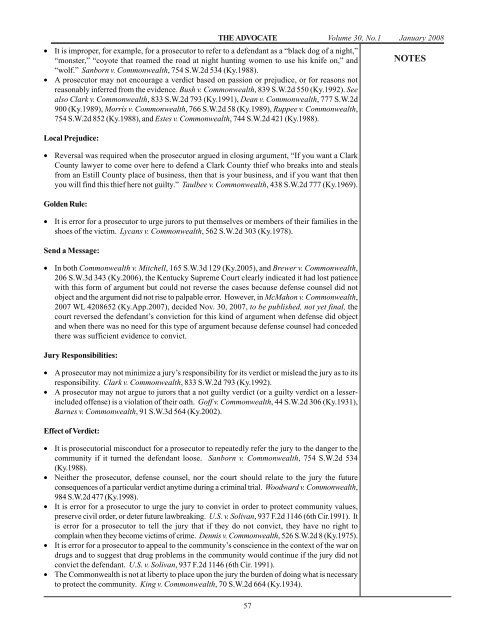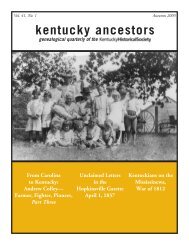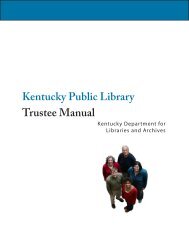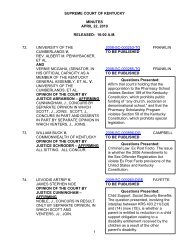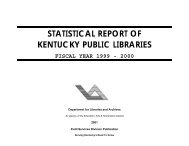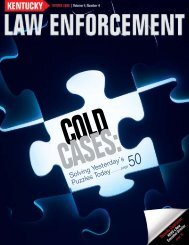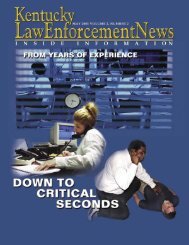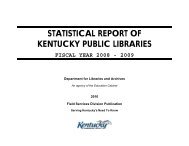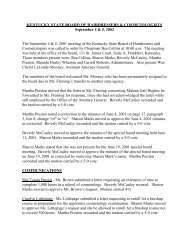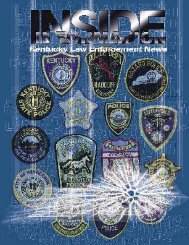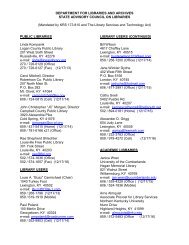Jan08 Advo.pmd - e-archives Home
Jan08 Advo.pmd - e-archives Home
Jan08 Advo.pmd - e-archives Home
Create successful ePaper yourself
Turn your PDF publications into a flip-book with our unique Google optimized e-Paper software.
THE ADVOCATE Volume 30, No.1 January 2008<br />
• It is improper, for example, for a prosecutor to refer to a defendant as a “black dog of a night,”<br />
“monster,” “coyote that roamed the road at night hunting women to use his knife on,” and<br />
“wolf.” Sanborn v. Commonwealth, 754 S.W.2d 534 (Ky.1988).<br />
• A prosecutor may not encourage a verdict based on passion or prejudice, or for reasons not<br />
reasonably inferred from the evidence. Bush v. Commonwealth, 839 S.W.2d 550 (Ky.1992). See<br />
also Clark v. Commonwealth, 833 S.W.2d 793 (Ky.1991), Dean v. Commonwealth, 777 S.W.2d<br />
900 (Ky.1989), Morris v. Commonwealth, 766 S.W.2d 58 (Ky.1989), Ruppee v. Commonwealth,<br />
754 S.W.2d 852 (Ky.1988), and Estes v. Commonwealth, 744 S.W.2d 421 (Ky.1988).<br />
Local Prejudice:<br />
• Reversal was required when the prosecutor argued in closing argument, “If you want a Clark<br />
County lawyer to come over here to defend a Clark County thief who breaks into and steals<br />
from an Estill County place of business, then that is your business, and if you want that then<br />
you will find this thief here not guilty.” Taulbee v. Commonwealth, 438 S.W.2d 777 (Ky.1969).<br />
Golden Rule:<br />
• It is error for a prosecutor to urge jurors to put themselves or members of their families in the<br />
shoes of the victim. Lycans v. Commonwealth, 562 S.W.2d 303 (Ky.1978).<br />
Send a Message:<br />
• In both Commonwealth v. Mitchell, 165 S.W.3d 129 (Ky.2005), and Brewer v. Commonwealth,<br />
206 S.W.3d 343 (Ky.2006), the Kentucky Supreme Court clearly indicated it had lost patience<br />
with this form of argument but could not reverse the cases because defense counsel did not<br />
object and the argument did not rise to palpable error. However, in McMahon v. Commonwealth,<br />
2007 WL 4208652 (Ky.App.2007), decided Nov. 30, 2007, to be published, not yet final, the<br />
court reversed the defendant’s conviction for this kind of argument when defense did object<br />
and when there was no need for this type of argument because defense counsel had conceded<br />
there was sufficient evidence to convict.<br />
Jury Responsibilities:<br />
• A prosecutor may not minimize a jury’s responsibility for its verdict or mislead the jury as to its<br />
responsibility. Clark v. Commonwealth, 833 S.W.2d 793 (Ky.1992).<br />
• A prosecutor may not argue to jurors that a not guilty verdict (or a guilty verdict on a lesserincluded<br />
offense) is a violation of their oath. Goff v. Commonwealth, 44 S.W.2d 306 (Ky.1931),<br />
Barnes v. Commonwealth, 91 S.W.3d 564 (Ky.2002).<br />
Effect of Verdict:<br />
• It is prosecutorial misconduct for a prosecutor to repeatedly refer the jury to the danger to the<br />
community if it turned the defendant loose. Sanborn v. Commonwealth, 754 S.W.2d 534<br />
(Ky.1988).<br />
• Neither the prosecutor, defense counsel, nor the court should relate to the jury the future<br />
consequences of a particular verdict anytime during a criminal trial. Woodward v. Commonwealth,<br />
984 S.W.2d 477 (Ky.1998).<br />
• It is error for a prosecutor to urge the jury to convict in order to protect community values,<br />
preserve civil order, or deter future lawbreaking. U.S. v. Solivan, 937 F.2d 1146 (6th Cir.1991). It<br />
is error for a prosecutor to tell the jury that if they do not convict, they have no right to<br />
complain when they become victims of crime. Dennis v. Commonwealth, 526 S.W.2d 8 (Ky.1975).<br />
• It is error for a prosecutor to appeal to the community’s conscience in the context of the war on<br />
drugs and to suggest that drug problems in the community would continue if the jury did not<br />
convict the defendant. U.S. v. Solivan, 937 F.2d 1146 (6th Cir. 1991).<br />
• The Commonwealth is not at liberty to place upon the jury the burden of doing what is necessary<br />
to protect the community. King v. Commonwealth, 70 S.W.2d 664 (Ky.1934).<br />
57<br />
NOTES


